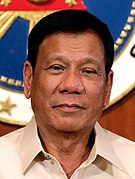| ||
|---|---|---|
Early political career
Personal and public image | ||
Opinion polling, known as surveys in the Philippines, on the presidency of Rodrigo Duterte has been conducted by various pollsters from 2016 to 2022. Duterte retained his popularity throughout his term, [1] [2] and became the Philippines' most trusted official immediately after assuming office. [3] Social Weather Stations (SWS) reported that Duterte had his lowest approval rating in mid-2018. [4] Pollsters and analysts noted Duterte's popularity was a rarity among Philippine presidents during their lame duck period given the public's propensity for getting bored with the current leadership as they excitedly look toward a new name to shade on the ballots for the next presidential election. [1] [2] By the end of his term, Duterte received his highest SWS approval rating and effectively became the Philippines' most popular post-EDSA president to date in spite of the controversies surrounding his administration. [5] [6]


